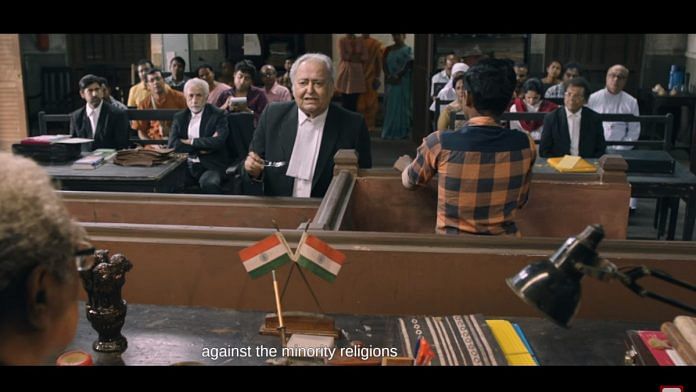When you walk into the theatre knowing that you are going to witness two thespians on screen — the late Soumitra Chatterjee and Naseeruddin Shah — you know you’d see something of substance. A Holy Conspiracy could have been a great film, for the most part, it still is a good film. But much like elaichi in biryani, the jarring background music, and convoluted dialogues leave you with a weird aftertaste.
The trilingual (Bengali, Hindi, English) film has its heart in the right place. Director Saibal Mitra has delivered a thought-provoking court drama that would be revered for its representation of marginalised communities and commentary on the socio-political climate of the country, if not so much for the cinematic craft.
A Holy Conspiracy dives into the controversial debate on what must take precedence — religion or science, and the right to think independently. With two stalwarts of Indian cinema anchoring the narrative, it will nudge you to think and ponder over where our country is headed.
Also read: Dark, twisted and warped, Vikrant Rona is a ‘messy’ treat. Watch it for Kiccha Sudeep
Thought-provoking plot
The film is set against the backdrop of an Adivasi Christian-dominated area named Hillolganj, somewhere in India. Kunal Joseph Baske (Sraman Chatterjee), a science teacher who happens to be an atheist and a Santhal, refuses to teach Bible’s Genesis chapter before Charles Darwin’s theory of evolution — hence, going against the school rules.
He chooses to teach what he claims to believe and be well-versed in i.e. proven scientific knowledge as opposed to teaching science from a Vedic textbook. In one of the chapters, the book claims that some sage Karnad had discovered laws of motion much before Isaac Newton. Following this, Baske is suspended and imprisoned.
Two months later, when he is presented in court, he pleads not guilty. Former Supreme Court advocate Anton De Souza (Naseeruddin Shah) comes out of retirement to defend Baske. Reverend Basanta Kumar Chatterjee (Soumitra Chatterjee), a celebrated advocate and member of Parliament, is hired by the church’s pastor. From hereon, the courtroom drama and arguments between the two old-time allies make for the rest of the film.
The film is adapted from the famous American play called Inherit the Wind, by Jerome Lawrence and Robert E. Lee. The story fictionalises the 1925 case — Scopes “Monkey” Trial — that took place in Tennessee, USA wherein a school teacher was prosecuted for teaching evolution theory in a church-funded school.
Also read: Cliched, exaggerated—Netflix’s serial killer in ‘Indian Predator’ is only an archetype
Representation matters
Often times, in the over two-hour long film, Baske, who belongs to a tribal community, is ridiculed and ill-treated due to his identity. At one point, a journalist mockingly addresses him as “Rohith Vemula of Hillolganj”. Vemula, a Dalit research scholar at Hyderabad Central University, died by suicide in 2016.
As the film proceeds, we are shown how Baske was targeted and a sinister plan was woven to punish him for his views and opinions. In a scene, his fiance Reshmi (Amrita Chattopadhyay) is called in for interrogation by the State prosecutor and she is asked to reveal Baske and her private conversations over his tribal identity. At this point, Baske pleads with her not to disclose as he anticipated the court would misinterpret. And misinterpret they did.
Much like the Malayalam film Jana Gana Mana (2022), defense counsel De Souza calls out the double standards of majoritarian sections and the adversities faced by the marginalised communities. “The right to think is on trial,” says De Souza, voicing the voiceless and suppressed factions of society.
Baske, who represents the tribal community in the film, delivers a speech towards the climax, expressing his pride over being a Santhal and emotes the internal turmoil. It is refreshing to see a tribal character being portrayed beyond the cliches and regressive stereotypes.
A Holy Conspiracy is brimming with potential and could have been an iconic film if only the background score and overfeeding of dialogues would have been omitted.



